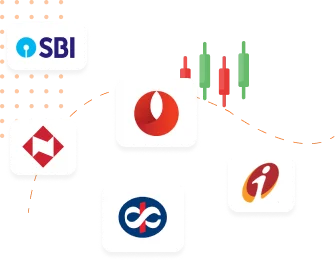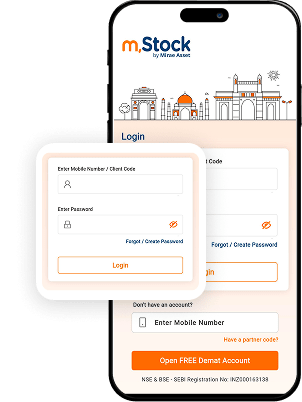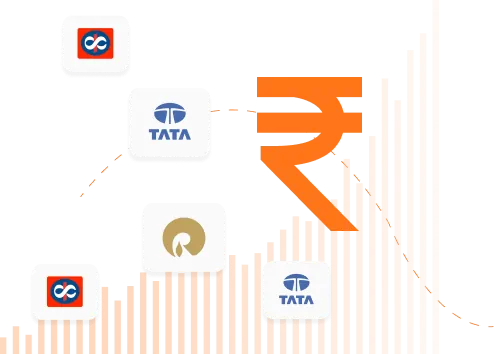What is ETF?
An ETF or exchange-traded fund is a basket of securities such as equities and bonds that are traded in the exchange throughout the day. With m.Stock, invest in ETFs at ZERO brokerage on delivery with funding and margin benefit.
5 reasons to invest in ETFs with m.Stock
- ZERO brokerage orders on delivery
- 1-click orders
- Funding with Pay Later (MTF) from 6.99% p.a. (0.0192% per day)
- 80% margin with Pledge Shares
- Pledge ETFs for instant trading margin
- Monitor ETFs in a separate portfolio view

Best performing ETFs
Explore ETFs
- Price
- Type
- Today's Best Performing
- Yesterday's Most Bought
- ALL
- < 50
- < 100
- < 200
- < 500
How to invest in ETF on m.Stock?
- 1
Login to m.Stock app
- 2
Search for desired ETF and click on Buy
- 3
Enter quantity and other details and place order
Start your investment journey


Types of ETF
Stock ETFs
Pool of stocks that mimic specific indices based on theme or sector
Bond ETFs
Investment in specific fixed-income securities such as bonds
Commodity ETFs
Investment in individual or basket of physical assets namely Gold & Silver
Benefits of investing in ETFs
- Low cost investment
- Minimal tracking error
- Low expense ratio
- Intraday trading
- Portfolio diversification
- Better transparency
Choose your investment type
ETF vs Mutual Fund
| Differences | ETF | Mutual Fund |
|---|---|---|
| Investment | Passively managed; tracks an index, making them less risky and transparent. | Actively managed by fund managers who invest in securities based on their analysis |
| Trading | Can be traded through the day where the price changes from minute-to-minute as per the market | Can be bought at any time of the day, however, NAVs of mutual fund schemes are declared at the end of each trading day, based on which MFs are allotted |
| Liquidity | Higher | Lower |
| Expense ratio | Lower | Higher |
| Minimum investment | Investors can start small | Higher minimum investment |
| Tax efficiency | Higher | Lower |
ETF vs Index Fund
| Differences | ETF | Index Fund |
|---|---|---|
| Trading | Traded on exchanges like stocks, throughout the day | Bought and sold at the end of the trading day at the net asset value (NAV) |
| Expense ratio | Lower expense ratios than index funds | Higher expense ratio |
| Minimum investment | Buy in increments of one share | Often requires a minimum investment amount |
| Flexibility | More flexible due to intraday trading | Less flexible since it only trades at the daily NAV |
| Demat account | Requires a demat account | Can be traded without a demat account |
| Investment style | SIPs not available | SIPs available |
FAQs
What is the difference between ETF and Mutual Fund?
ETFs (Exchange-Traded Funds) and mutual funds both create a pool of money from several investors to buy a diversified portfolio of assets. ETFs are traded on stock exchanges like individual stocks, offering real-time pricing and higher liquidity. Mutual funds, though, can be bought or sold only at the net asset value (NAV). This NAV is determined at the close of each trading day. Additionally, ETFs generally have lower expense ratios compared to mutual funds due to their passive management style.
What are the tax implications on an ETF?
ETFs are subject to capital gains tax when you sell your holdings. In India, selling equity ETFs in less than 12 months of owning them incurs short-term capital gains (STCG), which is taxed at 15%. If you hold them for more than 12 months before selling them, then long-term capital gains (LTCG) is applied. This is taxed at 10% on gains exceeding ₹1 Lakh in the financial year. For debt ETFs purchased on or after 01 April, 2023, the capital gains are added to your income and taxed as per your income tax slab.
Is investing in an ETF good?
Investing in ETFs can be a good option for many investors due to their low cost, diversification, and liquidity. ETFs offer exposure to a broad range of assets and are ideal for passive investors looking to track a specific index or sector. They provide a simple and efficient way to diversify your portfolio. However, it is important to research and choose ETFs that align with your investment goals and risk tolerance.
When to buy an ETF?
The best time to buy ETFs depends on your investment strategy and market conditions. Since ETFs are traded like stocks, you can buy them at any time during market hours. Many investors prefer to buy ETFs when the market is down to take advantage of lower prices. It's also wise to avoid buying ETFs during periods of high volatility unless you are an experienced trader. Regular investing through systematic investment plans (SIPs) can help mitigate the impact of market fluctuations.
Do ETF pay dividends?
Yes, many ETFs pay dividends if the underlying assets in the fund generate income, such as stocks or bonds that pay dividends or interest. These dividends can be paid out to investors in cash or reinvested to buy more units of the ETF. The frequency and amount of dividend payments depend on the specific ETF and its dividend policy, which can be found in the ETF’s prospectus.


